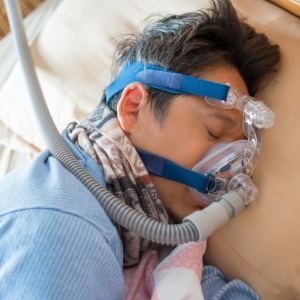Easing sleep apnoea may be key to stroke recovery
Investigators found that treatment of sleep apnoea with 'continuous positive airway pressure' (CPAP) therapy provides significant benefits to stroke patients.
0
Sleep apnoea is a known risk factor for stroke, and new research
suggests that curbing the condition might also aid the recovery of
people who've suffered a stroke or mini-stroke.Patients in the study typically used the CPAP mask – "continuous positive airway pressure" – to ease their nighttime breathing difficulties.
Added good news
The investigators found that, among stroke patients, "treatment of sleep apnoea with CPAP therapy provides significant benefits, even greater than the benefits of tPA, the FDA-approved drug treatment for stroke," said study lead researcher Dr Dawn Bravata.
"That's a substantial clinical effect," she said. "The added good news for stroke patients is that CPAP has been used as a sleep apnoea therapy for many years, and it has an excellent safety record." Bravata is a research scientist with the Regenstrief Institute and Roudebush VA Medical Center in Indianapolis.
According to the researchers, sleep apnoea is common among people who've had a stroke or mini-stroke, but few are currently diagnosed and treated for the condition. It's estimated that two out of three stroke patients are thought to have the condition, which causes irregular breathing during sleep. Sleep apnoea can lead to low oxygen levels, high blood pressure and an irregular heartbeat.
In the new study, Bravata's group tracked outcomes for 252 people who had experienced a stroke or mini-stroke (known as a transient ischaemic attack, or TIA) for up to one year. Patients were treated at one of five different hospitals in two states.
The patients were randomly divided into three groups: a control group who received standard care without sleep apnoea treatment; standard care plus CPAP therapy; or enhanced care with CPAP therapy. Patients who used CPAP did so for an average of 50% of nights.
A simple intervention
The researchers reported that 59% of patients who received CPAP therapy showed marked improvement in their recovery, in terms of improvements in neurological symptoms. This compared with 38% of those who didn't get CPAP.
Timing of therapy may be key, as well, the study authors said.
"Preliminary data suggests the sooner you treat sleep apnoea in stroke patients with CPAP, the more potent the effect of that treatment," Bravata said in a Regenstrief news release.
"Usually, diagnosing sleep apnoea is an outpatient service. But we need to make sleep testing acutely available to stroke and TIA patients in the hospital as part of their work-up," she said, "just as we do brain imaging, lab testing and cardiac monitoring as part of the initial stroke/TIA evaluation."
Two experts in stroke care believe the approach has real merit.
"This study is very interesting – it shows that a simple intervention, treating obstructive sleep apnoea, can improve outcomes in stroke patients," said Dr Andrew Rogrove. He is director of stroke services at Northwell Health's Southside Hospital in Bay Shore, New York.
Factor in stroke recovery
Rogrove said it would be even more interesting to assess recovery rates when CPAP was used more frequently than the 50% of nights observed in this study.
Dr Salman Azhar directs stroke care at Lenox Hill Hospital in New York City. He noted that several studies have shown sleep apnoea to be a factor in poor stroke recovery.
Testing for sleep apnoea shouldn't add much to the burden of care for stroke survivors, Azhar added.
"With the current ease of doing home sleep studies, the diagnosis of obstructive sleep apnoea has become much simpler and should be considered in all stroke patients with positive screening questionnaire results," he said.
The findings were published recently in the Journal of the American Heart Association.

No comments:
Post a Comment